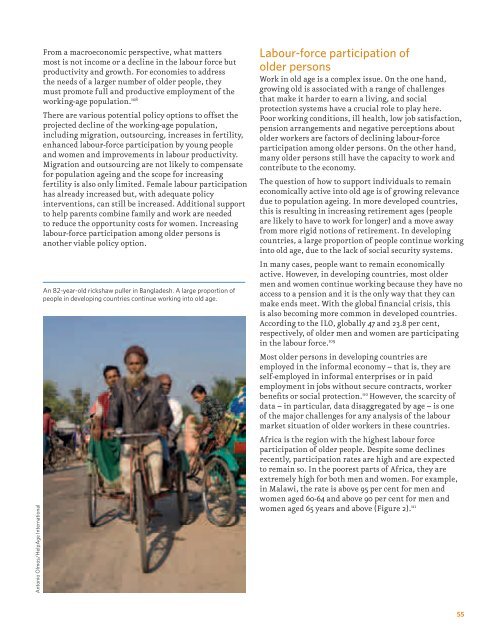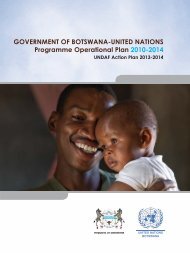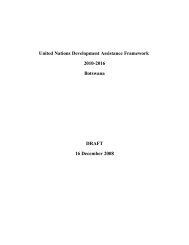Ageing in the Twenty-First Century: - HelpAge International
Ageing in the Twenty-First Century: - HelpAge International
Ageing in the Twenty-First Century: - HelpAge International
Create successful ePaper yourself
Turn your PDF publications into a flip-book with our unique Google optimized e-Paper software.
Antonio Olmos/<strong>HelpAge</strong> <strong>International</strong><br />
From a macroeconomic perspective, what matters<br />
most is not <strong>in</strong>come or a decl<strong>in</strong>e <strong>in</strong> <strong>the</strong> labour force but<br />
productivity and growth. For economies to address<br />
<strong>the</strong> needs of a larger number of older people, <strong>the</strong>y<br />
must promote full and productive employment of <strong>the</strong><br />
work<strong>in</strong>g-age population. 108<br />
There are various potential policy options to offset <strong>the</strong><br />
projected decl<strong>in</strong>e of <strong>the</strong> work<strong>in</strong>g-age population,<br />
<strong>in</strong>clud<strong>in</strong>g migration, outsourc<strong>in</strong>g, <strong>in</strong>creases <strong>in</strong> fertility,<br />
enhanced labour-force participation by young people<br />
and women and improvements <strong>in</strong> labour productivity.<br />
Migration and outsourc<strong>in</strong>g are not likely to compensate<br />
for population age<strong>in</strong>g and <strong>the</strong> scope for <strong>in</strong>creas<strong>in</strong>g<br />
fertility is also only limited. Female labour participation<br />
has already <strong>in</strong>creased but, with adequate policy<br />
<strong>in</strong>terventions, can still be <strong>in</strong>creased. Additional support<br />
to help parents comb<strong>in</strong>e family and work are needed<br />
to reduce <strong>the</strong> opportunity costs for women. Increas<strong>in</strong>g<br />
labour-force participation among older persons is<br />
ano<strong>the</strong>r viable policy option.<br />
An 82-year-old rickshaw puller <strong>in</strong> Bangladesh. A large proportion of<br />
people <strong>in</strong> develop<strong>in</strong>g countries cont<strong>in</strong>ue work<strong>in</strong>g <strong>in</strong>to old age.<br />
Labour-force participation of<br />
older persons<br />
Work <strong>in</strong> old age is a complex issue. On <strong>the</strong> one hand,<br />
grow<strong>in</strong>g old is associated with a range of challenges<br />
that make it harder to earn a liv<strong>in</strong>g, and social<br />
protection systems have a crucial role to play here.<br />
Poor work<strong>in</strong>g conditions, ill health, low job satisfaction,<br />
pension arrangements and negative perceptions about<br />
older workers are factors of decl<strong>in</strong><strong>in</strong>g labour-force<br />
participation among older persons. On <strong>the</strong> o<strong>the</strong>r hand,<br />
many older persons still have <strong>the</strong> capacity to work and<br />
contribute to <strong>the</strong> economy.<br />
The question of how to support <strong>in</strong>dividuals to rema<strong>in</strong><br />
economically active <strong>in</strong>to old age is of grow<strong>in</strong>g relevance<br />
due to population age<strong>in</strong>g. In more developed countries,<br />
this is result<strong>in</strong>g <strong>in</strong> <strong>in</strong>creas<strong>in</strong>g retirement ages (people<br />
are likely to have to work for longer) and a move away<br />
from more rigid notions of retirement. In develop<strong>in</strong>g<br />
countries, a large proportion of people cont<strong>in</strong>ue work<strong>in</strong>g<br />
<strong>in</strong>to old age, due to <strong>the</strong> lack of social security systems.<br />
In many cases, people want to rema<strong>in</strong> economically<br />
active. However, <strong>in</strong> develop<strong>in</strong>g countries, most older<br />
men and women cont<strong>in</strong>ue work<strong>in</strong>g because <strong>the</strong>y have no<br />
access to a pension and it is <strong>the</strong> only way that <strong>the</strong>y can<br />
make ends meet. With <strong>the</strong> global f<strong>in</strong>ancial crisis, this<br />
is also becom<strong>in</strong>g more common <strong>in</strong> developed countries.<br />
Accord<strong>in</strong>g to <strong>the</strong> ILO, globally 47 and 23.8 per cent,<br />
respectively, of older men and women are participat<strong>in</strong>g<br />
<strong>in</strong> <strong>the</strong> labour force. 109<br />
Most older persons <strong>in</strong> develop<strong>in</strong>g countries are<br />
employed <strong>in</strong> <strong>the</strong> <strong>in</strong>formal economy – that is, <strong>the</strong>y are<br />
self-employed <strong>in</strong> <strong>in</strong>formal enterprises or <strong>in</strong> paid<br />
employment <strong>in</strong> jobs without secure contracts, worker<br />
benefits or social protection. 110 However, <strong>the</strong> scarcity of<br />
data – <strong>in</strong> particular, data disaggregated by age – is one<br />
of <strong>the</strong> major challenges for any analysis of <strong>the</strong> labour<br />
market situation of older workers <strong>in</strong> <strong>the</strong>se countries.<br />
Africa is <strong>the</strong> region with <strong>the</strong> highest labour force<br />
participation of older people. Despite some decl<strong>in</strong>es<br />
recently, participation rates are high and are expected<br />
to rema<strong>in</strong> so. In <strong>the</strong> poorest parts of Africa, <strong>the</strong>y are<br />
extremely high for both men and women. For example,<br />
<strong>in</strong> Malawi, <strong>the</strong> rate is above 95 per cent for men and<br />
women aged 60-64 and above 90 per cent for men and<br />
women aged 65 years and above (Figure 2). 111<br />
55







